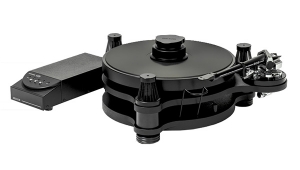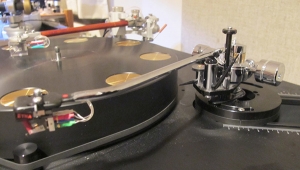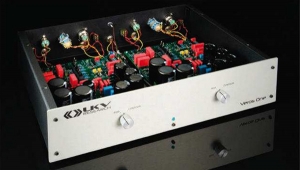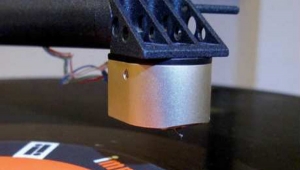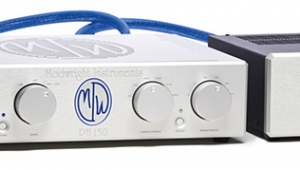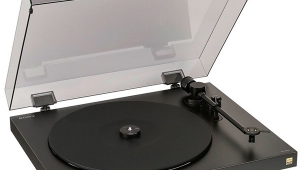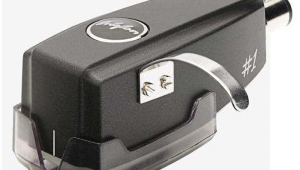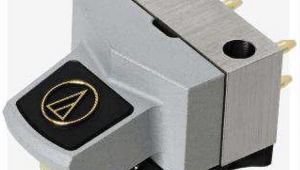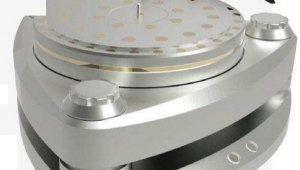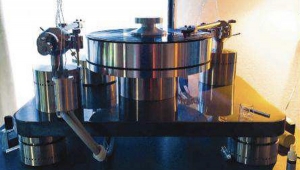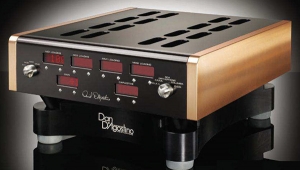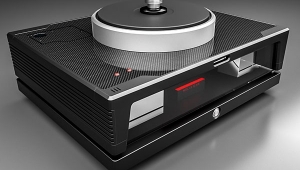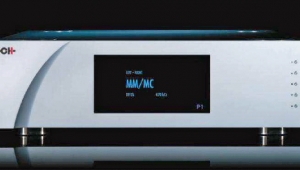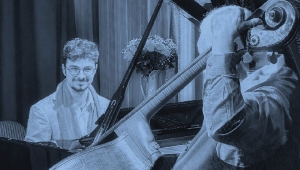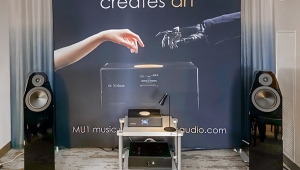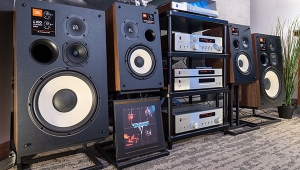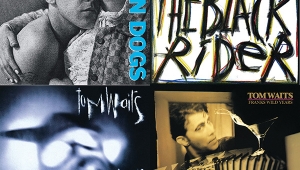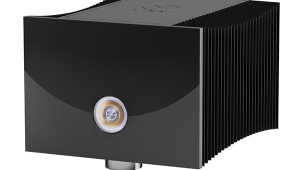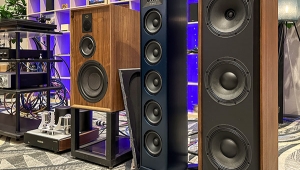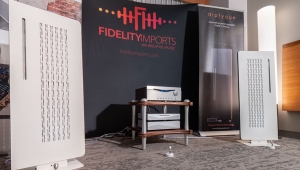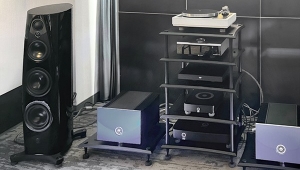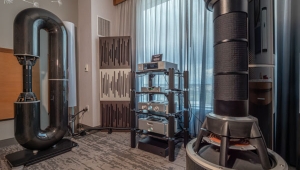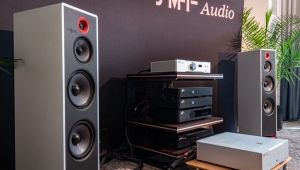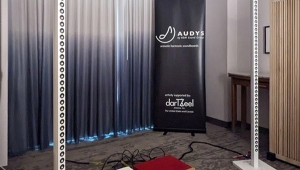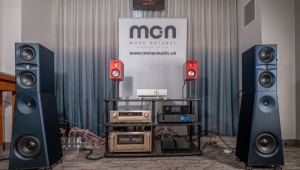| Columns Retired Columns & Blogs |
Analog Corner #252: Sony PS-HX500 USB turntable & GEM Dandy PolyTable Page 2
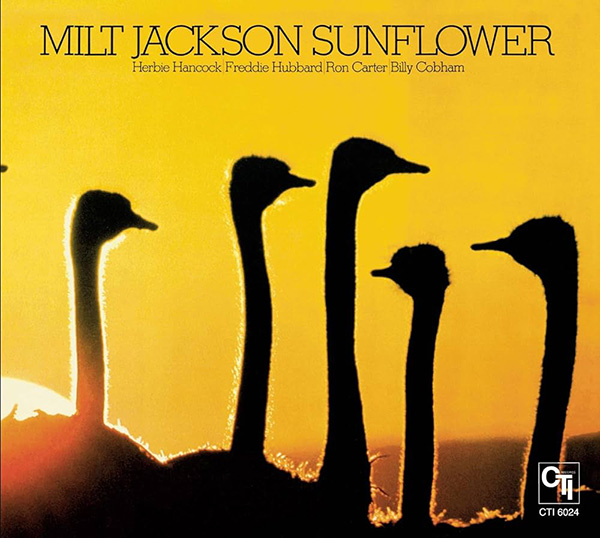
Digital Playback: Among other discs, I ripped a reissue of Milt Jackson's Sunflower (LP, CTI/Pure Pleasure 6024) to both CD and DSD128 resolutions. If you needed more proof that CD resolution is not transparent to the source and that double DSD gets much closer, these two files would convince you: The CD-rez file sounded spatially flat and somewhat crunchy on top; the DSD was smoother, more spacious, more like the LP.
If you buy a Sony PS-HX500 to archive your LPs, you'll find its playback, recording, and editing functions relatively easy to use. On a Mac, the files show up in a subfolder of the Music folder; I used JRiver Media Center to play the DSD files. You also might find that the Sony's quiet backgrounds, smooth and warm sound, and ease of use will entice you to buy more vinyl. Don't say I didn't warn you.
A Worthwhile Tweak: When I swapped in Funk Firm's Achromat record mat (use the 5mm-thick version) for the Sony's stock rubber mat, the sound tightened up, became more precise and transparent, and reduced somewhat the Sony's pleasant but artificial warmth. The Achromat costs $130, but it's a worthwhile investment: after all, you can always use it on your next turntable (footnote 2).
You can also replace the PS-HX500's Audio-Technica cartridge. Sony says they'll provide a list of recommendations, but that list was not yet available by deadline. I wish they'd include an overhang template for the PS-HX500's tonearm, but they don't.
Conclusions: If you already have a good turntable, Sony's PS-HX500 isn't aimed at you: you can digitize your vinyl by adding an outboard A/D converter. Otherwise, if you want to conveniently and easily archive LPs to hi-rez digital, including—especially—to DSD128, the Sony PS-HX500 is an excellent all-in-one choice that costs less than any standalone DSD converter I know of. While it may look basic, even rudimentary, based on the sound produced by it and its built-in MM phono preamp, it's clear that Sony's engineers put a lot of time, effort, and listening into designing the PS-HX500.
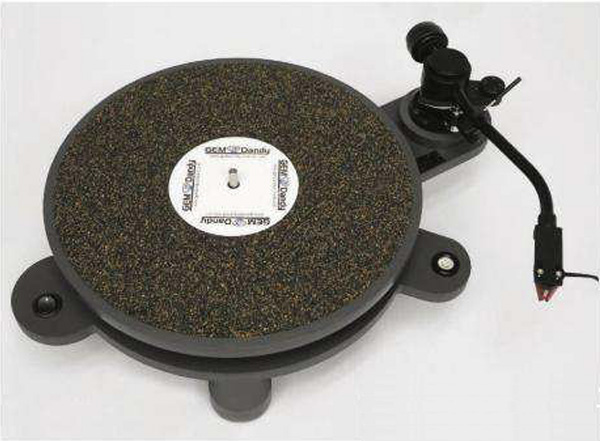
GEM Dandy PolyTable turntable
George E. Merrill has been modifying and designing turntables for decades. The name of his company, GEM Dandy (footnote 3), begins with his initials, and the PolyTable is his most recent turntable design. It costs $1695 with Jelco's SA-750D 9" tonearm, $1495 with Jelco's SA-250 9" arm, or $1895 with Jelco's SA-750E 10" arm. An ultra-low-mass design, it's intended to exhibit a chassis resonance of 19Hz, well away from frequencies that produce problems with arm/cartridge resonances. Merrill calls his approach Energy Management Design.
High-mass turntables can work if properly executed; so can low-mass ones, as demonstrated by the PolyTable and models from Rega Research. Generally speaking, poorly designed high-mass designs sound sluggish and thick. Poorly designed low-mass 'tables sound hollow, with midbass resonances.
The PolyTable's lightweight, one-piece plinth is made of hard, synthetic polymer, as are its main platter and smaller subplatter. Merrill's proprietary R.C.C. (rubber-cork compound) mat material is bonded to both platters. The flat rubber drive belt is looped around the subplatter's circumference and the motor's stepped, crowned polymer pulley.
All the goods are on the plinth: custom low-voltage AC motor, oil-well type long-spindled platter bearing, armboard, On/Off switch, and built-in bubble level. The plinth sits on three tall, adjustable feet, to the bottoms of which you press soft footer nuggets. With any suspensionless turntable, the sound quality will greatly depend on what the 'table sits on, and these nuggets were quite effective isolators.
Setup was simple, so I won't describe it. Nor will I review the Jelco SA-750D tonearm here, other than in the context of the PolyTable and to say that it's fully adjustable in every parameter, and particularly well made for its modest price (ca $600). The Jelco has got to be one of analog playback's best buys, made even more attractive because GEM Dandy generously includes a better-than-run-of-the-mill AudioQuest DIN-to-RCA cable.
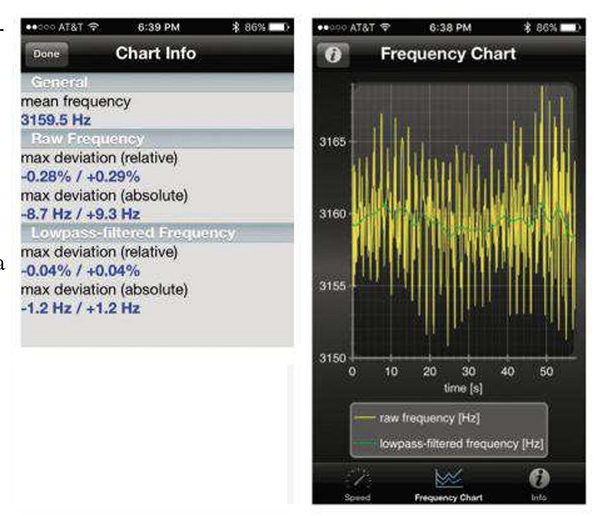
Figs.3 & 4 GEM Dandy PolyTable, speed stability data and speed stability (raw frequency yellow; low-pass filtered frequency green).
It still amazes me that turntable reviews all over the Internet and in some print publications don't disclose whether the 'table runs at the correct speed, which is obviously Job No.1. The PolyTable ran slightly fast, by about the same amount (0.3%) as the Sony PS-HX500 ran slow, reproducing a 3150Hz tone as 3159.5Hz (fig.3). This was not audible as a change in pitch. The low-pass-filtered test-record numbers were very good: ±0.04% maximum low-pass-filtered relative speed (fig.4).
As explained on GEM Dandy's website, changes in temperature and humidity affect the expansion and contraction of materials, which of course will affect speed accuracy. Merrill also offers a Digital Motor Drive ($690), which isolates the motor from the mains supply and includes a variable speed controller. I wasn't sent one for review, but I did have Phoenix Engineering's Falcon PSU power supply ($379), which I reviewed on analogplanet.com. It worked well with the PolyTable, halving the maximum low-pass-filtered relative speed deviations (±0.02%). I listened with and without the Falcon PSU; either way, the PolyTable was a near miracle of rhythm'n'pace excellence, tonal neutrality, image stability, and just plain honest listening pleasure. In the Jelco arm's headshell I installed a Lyra Helikon SL moving-coil cartridge, and ran it into a Bob's Devices Sky CineMag step-up transformer ($1250) driving a Lejonklou Gaio MM phono preamp ($895).
I then spent many long evenings enjoying the sound, without reservation. This combination—as well as the GEM Dandy with less-expensive electronics, including the brand-new iPhono2 phono stage ($499, just in for review)—produced the kind of smooth, effortless, "tinkly-free" musical flow, three-dimensional spaciousness, and midband richness that are attractive to those of any age who love music played from vinyl.
If the PolyTable erred in any direction, it was in its less-than-full bass extension—though most people buying one probably won't use it with full-range speakers. But that was more than made up for by its snappy, rhythmically engaging pace and flow. This 'table's image stability and soundstaging abilities were remarkable for a turntable of any price.
The PolyTable was also very quiet, with very low background noise. Though the plinth was lively when I tapped it with a finger with the stylus in the groove, the tall footers provided better isolation than do many far more expensive 'tables.
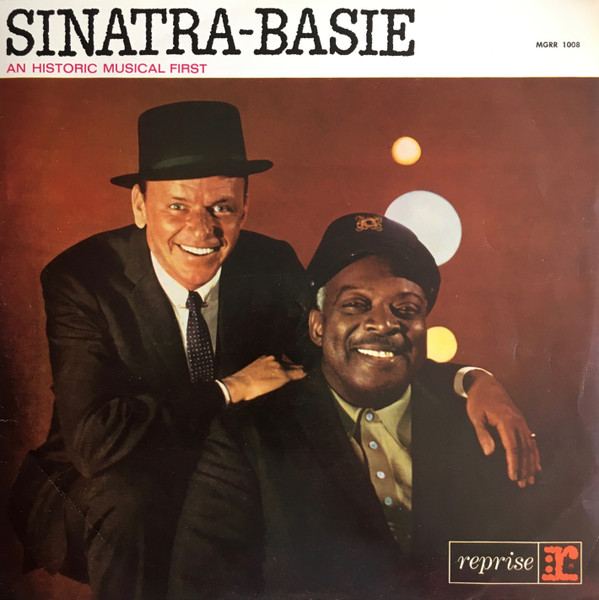
I'm listening now to Sinatra-Basie: An Historic Musical First (LP, Reprise FS-1008), recorded in fall 1962. I compared it with the CD edition and with the new, digitally sourced LP that's part of Universal Music's 100 Sinatra series. (I wish Sinatra's family had left his catalog with Mobile Fidelity Sound Lab, which was doing it all analog.) In Leslie Bricusse's "My Kind of Girl," drummer Sonny Payne does a bit of fancy stick work on his snare rim that reverberates across the stage, from right channel to left. Without comparing formats or 'tables, the PolyTable's rendering was remarkably precise and believable. It was good enough to make me stop typing and look up at the speakers.
After the well-deserved rave review I wrote of the above-mentioned Dameronia with Strings, a reader asked if it sounded as good as an album by Philly Joe Jones's group Dameronia, which I'd never heard of. On Discogs.com I found, for less than $15, the group's Look, Stop and Listen (LP, Uptown UP 27.15). Rudy Van Gelder engineered and cut lacquers for it in 1983. The producers were Helen Keane, Bill Evans's longtime producer, and two physicians—one of whom, Montreal-based internist Robert E. Sunenblick, founded Uptown. The jacket lists an earlier release, Dameronia: To Tadd with Love (Uptown UP 27.11). Maybe that's the one the reader was referring to, but Look, Stop and Listen is a great, fine-sounding find that I otherwise wouldn't have known about. I love record collecting!
I haven't yet played it on the big rig. I'm enjoying it too much through the PolyTable, Helikon SL, Sky CineMag, and Gaio to care. Walter Davis Jr.'s piano sounds a bit lighter in weight than I expect it will sound through the big rig, but the transients are so beautifully reproduced by this relatively inexpensive combo—as are Jones's drums—and the stage is so three-dimensional and finely set, I'm good!
At $1695 including the Jelco SA-750D, the GEM Dandy PolyTable is easy to recommend. There are more graceful- and conventional-looking 'tables out there at the price, and perhaps one or more of them has better bass extension, but if they do, I wouldn't be surprised if it was at the cost of the PolyTable's stellar rhythm'n'pace. I'd give up a bit on the bottom to get this 'table's entertaining drive. I didn't want to turn it off.
Footnote 2: The Funk Firm, UK. Tel: (44) (0)7846-798367, (44) (0)1273-585042. Web: www.thefunkfirm.co.uk. US distributor: Pro Audio Ltd., 111 N. South Drive, Tower Lakes, IL 60010. Tel: (847) 526-1660. E-mail: proaudio@comcast.net
Footnote 3: GEM Dandy Products Inc., George Merrill's Audio Emporium, 820 Herbert Road, #109, Cordova, TN 38018. Tel: (901) 751-3337. Web: www.hihigem.com
- Log in or register to post comments
